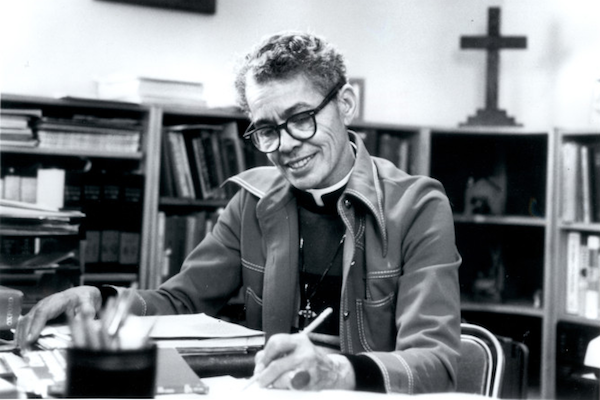Pauli Murray was a Black, nonbinary, queer poet, writer, lawyer and priest whose legacy carries on through law and activism. Born in Baltimore, MD in 1910, Murray moved to New York City after graduating high school and attended Hunter College to pursue a degree in English Literature. Murray was an avid writer and gained national media attention after campaigning to attend the University of North Carolina, which at the time was exclusively white. Murray studied law at Howard University and continued to write civil rights essays and poems.
Murray’s work was influential for decades — former President John F. Kennedy appointed Murray to the Committee on Civil and Political Rights, where Murray worked with civil rights activists like A. Philip Randolph, Bayard Rustin, and Martin Luther King.
In the world of legal reform, Murray influenced both Ruth Bader Ginsburg and Thurgood Marshall. Marshall used Murray’s senior thesis from Howard, “Should the Civil Rights Cases and Plessy be Overruled?” to successfully argue Brown v. Board of Education in 1954. In an interview with Time Magazine, Ginsburg credited Murray for the idea to interpret the 14th Amendment’s Equal Protection Clause, which states that it’s unconstitutional to deprive “any person” of equal protections. This interpretation, which appeared in Murray’s 1965 article “Jane Crow and the Law” helped Ginsburg win Reed v. Reed. Murray’s name is credited on the brief as an honorary writer.
Murray’s legacy lasts as a pioneer breaking sexuality and gender norms. Struggles with gender identity lasted Murray’s entire life. After being rejected from Harvard because the school only accepted male applicants, Murray wrote back that “I would gladly change my sex to meet your requirements, but…the way to such change has not been revealed to me.”
Murray sought hormone therapy unsuccessfully for years and even persuaded doctors to perform tests to see if Murray was born with hidden male genitalia or hormones. The Pauli Murray Center reports that Murray used the phrase “he/she personality” with family members . They chose “Pauli” as a gender neutral name over their birth name, Anna Pauline. Murray also had two significant romances in their life with women, one of which was described as Murray’s life partner.
Murray is also notable for breaking yet another barrier by becoming the first Black woman to become an Episcopal priest. They became the first woman to give the Eucharist in the Episcopal Church in North Carolina.
Remembered today as the silent warrior behind some of the country’s most crucial civil rights cases, Pauli Murray is a hero to many and one to be especially remembered during Black History Month.

